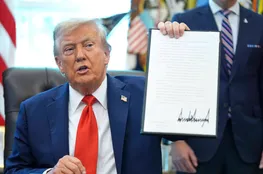June 4 (UPI) -- President Donald Trump on Wednesday issued a proclamation to "fully restrict and limit" entry of people from 12 foreign countries starting at 12:01 EDT Monday. Citing national security concerns, Trump issued the ban on nationals from Afghanistan , Burma, Chad, Republic of the Congo, Equatorial Guinea, Eritrea, Haiti, Iran, Libya, Somalia, Sudan and Yemen. Also, he partially restricted and limited entry from seven countries: Burundi, Cuba, Laos, Sierra Leone, Togo, Turkmenistan and Venezuela. Of the 19 named nations, 10 are in Africa. "These restrictions distinguish between, but apply to both, the entry of immigrants and nonimmigrants," the proclamation reads about the two designations," the proclamation reads. There are exceptions for lawful permanent residents, existing visa holders, certain visa categories and individuals whose entry serves US national interests. Later Wednesday, he posted a video on Truth Social announcing the bans. "The list is subject to revision based on whether material improvements are made," Trump said. "And likewise new countries can be added as threats emerge around the world, but we will not allow people to enter our country who wish to do us harm and nothing will stop us from keeping America safe." The proclamation reads: "As President, I must act to protect the national security and national interest of the United States and its people. I remain committed to engaging with those countries willing to cooperate to improve information-sharing and identity-management procedures, and to address both terrorism-related and public-safet y risks. Nationals of some countries also pose significant risks of overstaying their visas in the United States, which increases burdens on immigration and law enforcement components of the United States, and often exacerbates other risks related to national security and public safety." White House deputy press secretary Abigail Jackson wrote on X : "President Trump is fulfilling his promise to protect Americans from dangerous foreign actors that want to come to our country and cause us harm. These commonsense restrictions are country-specific and include places that lack proper vetting, exhibit high visa overstay rates, or fail to share identity and threat information."
On his first day in office on Jan. 20, Trump signed an executive order that it is the policy of the United States to "protect its citizens from aliens who intend to commit terrorist attacks, threaten our national security, espouse hateful ideology, or otherwise exploit the immigration laws for malev olenit purposes." Secretary of State Marco Rubio was ordered to compile a list of countries "for which vetting and screening information is so deficient as to warrant a partial or full suspension on the admission of nationals from those countries." The proclamation said: "Some of the countries with inadequacies face significant challenges to reform efforts. Others have made important improvements to their protocols and procedures, and I commend them for these efforts. But until countries with identified inadequacies address them, members of my Cabinet have recommended certain conditional restrictions and limitations." CNN reported Trump decided to sign the proclamation after the antisemtic attack in Boulder, Colo., though the system didn't come to the United States from the restricted countries. Mohamed Sabry Soliman, 45, of Colorado Springs, has been charged with a federal hate crime and he is facing 16 state counts of attempted murder on Monday. Soliman, an Egyptian national who spent time in Kuwait, entered California in August 2022 on a B2 visa that expired in February 2023 and his asylum claim was pending. Alex Nowrasteh, who works for Cato Institute, a nonpartisan and independent public policy research organization, said the threat of foreign-born terrorists is rare. "A single terrorist from those countries murdered one person in an attack on US soil: Emanuel Kidega Samson from Sudan, who committed an attack motivated by anti-white animus in 2017," Nowrasteh wrote.
The annual chance of being murdered by a terrorist from one of the banned countries from 1975 to the end of 2024 was about 1 in 13.9 billion per year. He also noted that travelers and immigrants from the 12 banned countries have a nationwide incarceration rate of 370 per 100,000 in 2023 for the 18-54 aged population, which 70 percent below that of native-born Americans. The data came from the U.S. Census and American Community Survey Data. During his first term, Trump banned travel by citizens of predominantly Muslim countries, including Iraq, Iran, Libya, Somalia, Sudan, Syria and Yemen. Amid legal challenges, it was modified and upheld by the Supreme Court in 2018. When President Joe Biden took office in 2021, he repealed it.
























